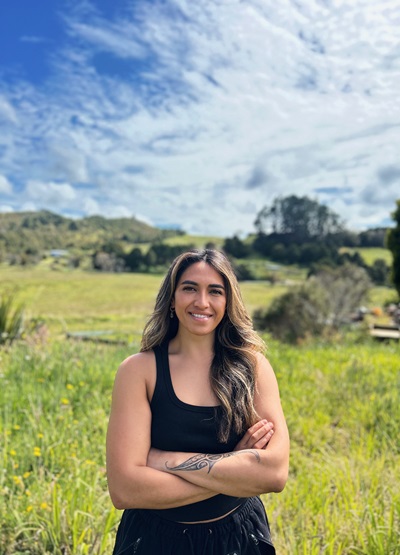2024 | Volume 25 | Issue 4

For Dr Maia Tipene, a first-year house officer at Whangārei Hospital, Aotearoa New Zealand, the Māori concept of tuakana-teina guides her medical career and extends beyond mere heritage. It represents mentorship and guidance between the experienced and inexperienced.
Growing up in a large family and community where tradition and modernity intersect, Dr Tipene brings a unique perspective to the medical field.
“On the surface, it refers to the relationship between siblings. However, from a deeper perspective, in terms of mentorship, it means I consistently had a mentor throughout my life, including during medical school and the early stages of my career. We are obliged to create a continuous circle of guidance. It’s hard to say how I consciously use this tikanga (value) because it’s innately there,” she says.
In her field, Dr Tipene has seen this bond contribute significantly. She has been part of several executive groups, including Te Oranga, the Māori Medical Students Association Aotearoa.
These groups hold annual congresses to unite Māori students and doctors, fostering connections and mentorship.
“Tauira (student) often find someone who will look after them, which is incredibly beneficial. If they are unsure about their career path or need advice, they can find experienced people who have navigated those challenges and are willing to help.”
Dr Tipene had several influential mentors during her medical education. “Dr Lincoln Nicholls, a training orthopaedic surgeon in Wellington was a driving force. He took me under his wing, allowing me to explore any opportunity as a student. Having someone who wants you to succeed and is inclusive was a huge driving force.
“I've encountered many other mentors. Currently, I am fortunate to be part of Dr Maxine Ronald’s team, one of the general surgeons here in Whangārei.
Dr Tipene grew up in Motatau, a rural area 45 minutes from her current workplace. She grew up on a dairy farm and attended a small school of 20 kids, all relatives. Later, she moved to a high school an hour away and then to boarding school in Hamilton, thanks to her father.
Being the youngest of nine, she was the first in her family to attend boarding school. The transition from a school of 300 to one with 1800 students was a significant culture shock for her.
Dr Tipene initially wanted to be a veterinarian, helping her father with difficult calving births on the farm. Her interest in biology and science grew, but she also noticed poor health literacy in her community, leading to early illness and death.
Medicine didn't seem like a possibility until a teacher in boarding school encouraged her. This encouragement, along with her passion for science and desire to improve health perceptions in her family, led her to pursue medicine at Otago Medical School, where she graduated last December.
Dr Tipene is always finding ways to connect with people and be herself, regardless of her position. This is when the tuakana-teina relationship also surfaces: “We organise meetings with senior doctors and medical students to build connections and create a supportive learning space for them”.
Last year, Dr Tipene was nominated for Young New Zealander of the Year, recognising her work during Cyclone Gabrielle in Hawkes Bay in 2023. With a return-of-service contract with the NZ Defence Force, she volunteered through Taskforce Kiwi and led multinational teams in critical first responder work.
"It was a nice feeling because you just do your job and don’t think about getting recognition or validation for it," she says.
Dr Tipene feels more Māori should study medicine. She strongly supports those with potential, especially those who might be too scared or have a small-town mindset that prevents them from envisioning such a future.
A big advocate of using leave, Dr Tipene loves travelling to see family and friends. Outside of work, she goes to the gym. "I love the balance," she says